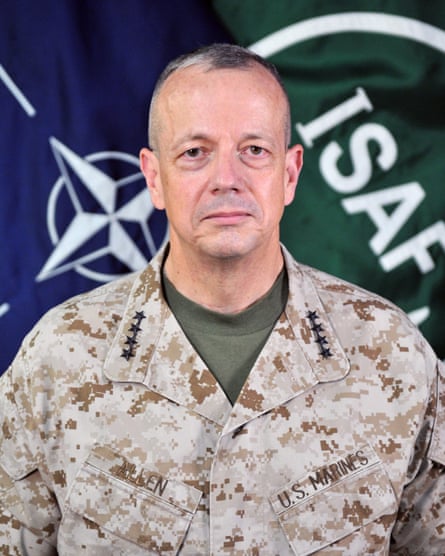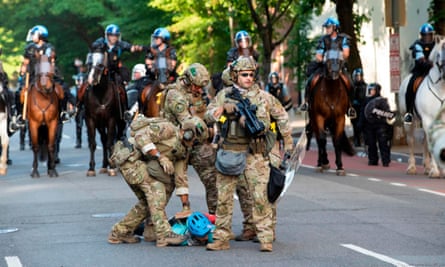The retired marine general who led the global coalition against Isis and commanded US forces in Afghanistan has warned that Donald Trump’s actions this week could start a US “ slide into illiberalism” and the beginning of the end of “the American experiment”.
In denouncing the president for his response to the George Floyd protests, John Allen became the latest in a string of venerable military figures to have gone public over what they describe as the threat posed by Trump to the non-political nature of the armed forces, and more broadly to US democracy.
Tensions over the role of the military in responding to the protests have also opened a rift between the president and his defence secretary, Mark Esper, who angered Trump on Wednesday by opposing the threatened use of the 1807 Insurrection Act to deploy troops on US streets.
Allen, now president of the Brookings Institution, also focused his criticism on the president’s threat on Monday to deploy the US military against protesters, and his use of force against a peaceful demonstration outside the White House so that he could be photographed holding a Bible in front of a church.

“The slide of the United States into illiberalism may well have begun on 1 June 2020. Remember the date. It may well signal the beginning of the end of the American experiment,” Allen wrote on the Foreign Policy website.
His commentary followed a similarly stinging denunciation on Wednesday from Trump’s first defence secretary, James Mattis, who described the actions taken on Monday in front of the White House as an “abuse of executive authority” and suggested that Trump and other officials should be held to account for making “a mockery of our constitution”.
Trump responded on Twitter by calling Mattis “the world’s most overrated General,” adding: “I didn’t like his leadership style or much else about him, and many others agree. Glad he is gone!”
More than 17,000 members of the national guard, a part-time reserve force jointly controlled by the states and the federal government, have been deployed by 23 states to support law enforcement.
But Trump has threatened to go further and invoke the Insurrection Act to deploy active-duty forces in US cities – against the wishes of the state authorities if necessary. A battalion from the elite 82nd Airborne Division, and two brigades of military police, were flown from their bases in North Carolina and New York to the Washington area at the beginning of the week, apparently to be on standby if the Insurrection Act was invoked.
Esper broke with Trump on a policy issue for the first time on Wednesday, saying the situation did not merit the use of the act and ordering the 82nd Airborne back to their base in Fort Bragg. But after visiting the White House he reversed that order, though on Thursday there were reports once more that the troops would be leaving Washington. A White House spokesman, Hogan Gidley, said on Thursday “all options are on the table” in terms of the use of active duty troops.
Uniformed military leaders in all the armed services have issued messages to their rank and file that, while not criticising the commander-in-chief directly, used a very different tone in discussing the situation from Trump’s insistence on “domination”. The officers emphasised the constitutional right to protest rather than the incidents of looting.
“As members of the Joint Force – comprised of all races, colors, and creeds – you embody the ideals of our Constitution,” General Mark Milley, the chairman of the joint chiefs of staff, said, “Please remind all of our troops and leaders that we will uphold the values of our nation, and operate consistent with national laws and our own high standards of conduct at all times.”
Trump frequently refers to “my generals” and “my military” but the statements by the service chiefs referred to the constitution, not the president.
The armed forces are one of the most diverse major US institutions, and are roughly representative of the country’s ethnic makeup. Senior officers have been deeply concerned about racial polarisation spreading to the military if it is drawn into dealing with the unrest.
The chief master sergeant of the air force, Kaleth Wright, wrote a series of tweets on Monday, expressing the agony caused by police killings of black Americans.
“Just like most of the Black Airmen and so many others in our ranks … I am outraged at watching another Black man die on television before our very eyes,” Wright wrote, and was quickly supported by his senior officers.

Kayla Williams, who served as an intelligence officer in the 101st Airborne Division, said the flurry of public and private statements “reveals deep unease, even among senior levels, and a real lack of cohesion among the senior levels of our government at this point”.
“Among the rank and file there also seems to be a great deal of discomfort at the prospect of having to intervene in civil unrest,” Williams, now a senior fellow at the Centre for a New American Security, said.
She added that deployment of an 82nd Airborne combat unit to the Washington area, was particularly inappropriate.
“I absolutely do not think that this type of unit is well suited for responding to domestic unrest. The troops have not gotten the type of de-escalation training that is critical,” Williams said.
James Dubik, a retired lieutenant general and a senior fellow at the Institute for the Study of War, said service members swear an oath to the constitution, and are at the same time obligated to follow the legal commands of the president.
“So if there’s a belief on the part of a senior military leader that an order – even if it’s a legal order – violates the constitution then that person is in a tough moral and professional dilemma,” Lt Gen Dubik said.
The options were to simply obey regardless, resign or attempt to convince the “final decision authority”, in this case the president, they are making a mistake.
“None of the options are good options,” he said, but added that the best was to seek to persuade the president in private, which he added, “I suspect is going on right now.”


